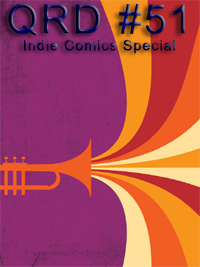
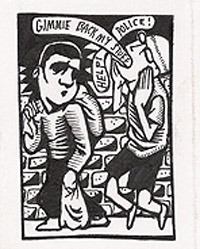
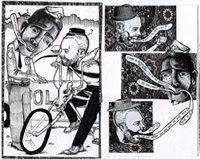
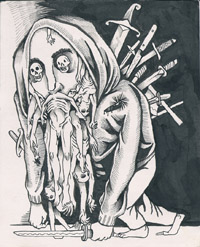
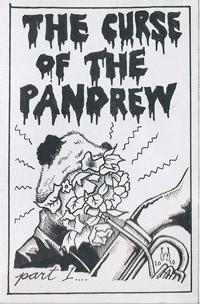
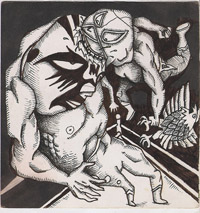
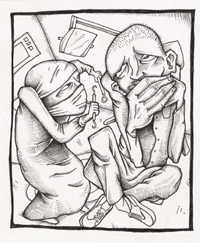
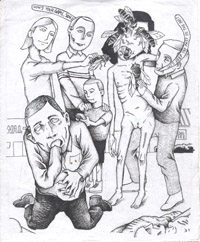
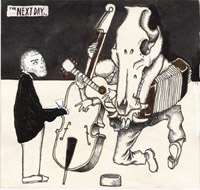
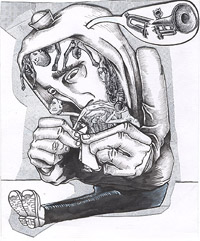
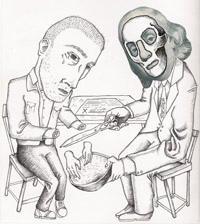
June 2011
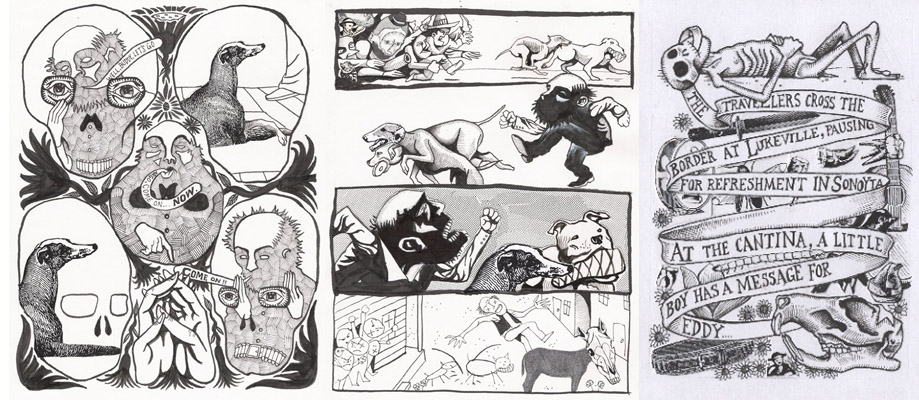
City: Warren/Providence, Rhode Island
Comics: The only properly published one I have ever had is “Dead in Disemboque”, with Soft Skull Press. Written by Robert Arellano, All the others have been self released books over the years.
Websites: www.williamschaff.com
QRD – How old were you when you first got into comics & did you always stick with them or did you come back to them?
William – I guess it would have been around high school; I got into my first X-Men & Batman comics. I mean, as a really small kid, I had some I enjoyed, but I don’t think I realized that they were series that continued & had back stories. That came later.
QRD – What was the first comic book you ever bought?
William – Tintin, the Crab with the Golden Claws, in Second grade. My best friend gave it to me & I started buying Tintin comics from there.
QRD – How old were you when you put out your first comic?
William – Somewhere between 23 & 25.
QRD – What decade do you think produced the best comics?
William – Ha. Good question. I don’t know if I could say that, because each decade has had something great coming out of it. If I had to pick one, I would say the 80s & 90s had the best, but that could be because that was when I was getting into them, so it may be a real uninformed opinion. I can think of amazing things from the beginning of the 20th century up until now. & each thing I think of stands out to me as a marvel of the medium.
QRD – Why comics instead of just writing or drawing?
William – Well, I do other forms of art as well. One thing I like about the books I have done is that most of them are without text. So the opportunity exists to create a narrative storyline that also allows people to explore them in the same way they might a single painting or drawing. Since there is no text telling them what to think, they have to create aspects of the plot themselves.
QRD – Do you see mini-comics & indie comics as paths to mainstream comics or as their own unique media?
William – The comics themselves are just that... a product of the artist. Can an artist use them as a path? Sure, if the artist wants to go that direction & stays the course. But it really is all about the creator & not the created.
QRD – How many copies of your comic do you print in your first run?
William – The first one I ever did I probably only made 50.
QRD – How much do you think comics should cost?
William – Depends on the comic. Some should cost a buck, some much more.
QRD – How many books do you produce a year & how many would you like to?
William – It varies from year to year for me, as I do not strictly do comics. I would love to have the budget & means to distribute thousands a year; but this is more wishful thinking, I believe, than anything else.
QRD – Do you think stories should be serialized or delivered as complete works?
William – Both are fun & have their place. I know for myself when I was actively collecting, I enjoyed the serialized aspect of them. Now, that I am older, I also very much appreciate being able to pick up a collection of the works. Plus if you think back to things like Little Nemo in Slumberland, where neither of us were around for when those came out, thank goodness for the publisher who puts them out in a collection!
QRD – How are comic strips different than comic books & which medium do you prefer?
William – Again, I don’t have a preference, but I also have done very few strips in my life. I think the strip artist has a greater challenge in front of them, trying to fit something enjoyable in so few frames. I think about someone like Julia Wertz, or Charles Schultz... the joy they can bring in so few images. I marvel at it.
QRD – How long is it from when you start a comic until it’s printed?
William – As in all things, there is not set time. I have pumped some out in a week & some out in several years.
QRD – What do you do better with your comics now than when you first started?
William – I don’t know if I have changed all that much since I first started (back in 1997). I guess I found a few different methods I like & have stuck with them. That probably doesn’t say much about my personal growth as an artist.
QRD – At what point in the artistic process do you work digitally?
William – I scan my artwork when it is finished so I can post it. That is the only digital aspect I ever really use. Only in Dead in Disemboque did I use the computer to color, or combine some things. But we are talking maybe 2 or three panels out of fifty pages.
QRD – What do you think of digital comics & webcomics?
William – Thank goodness for them. I have been able to see more comics than I would have without the access to the internet.
QRD – Do you prefer working in color or black & white?
William – Black & white.
QRD – How many different people should work on a comic & what should their jobs be?
William – Ha. Another interesting question. Well, the traditional roles seem to have worked well all these years. I can see if some artists wish to do all the different jobs (pencils, inking, coloring, text) & I guess that is one of the beauties of self-publishing... no one to tell you differently... but I don’t think there should be any set rule. I am very weary of set rules in art.
QRD – How do you find collaborators?
William – They find me. I am not a big fan of seeking out collaborators. The few that I have have been people I am a fan of & I just write them, or talk to them if they are nearby.
QRD – How tight do you think a script should be as far as telling the artist what to draw?
William – I don’t believe one should ever tell an artist what to draw. Unless they are an illustrator, submitting their work to an outside source of editing. Otherwise, one should back off & let the artist do what it is the artist does.
QRD – What comic book person would you be most flattered to be compared to?
William – Wow... I wouldn’t know where to begin. Windsor McCay would be super sweet for the strength of his drawing. Maybe Brian Ralph for the emotive quality of the story. Brian Chippendale for the excitement of the imagery. Julia Wertz for the humor. Steve Rude or Mike Mignola for the line strength.
QRD – What do your friends & family think of your comics?
William – Some like, some not so much. Most don’t even look at them as comics as my pages don’t follow the traditional “comic” formatting.
QRD – What do you think of superheroes?
William – I think they are awesome.
QRD – Marvel or DC?
William – Depends on the mood.
QRD – What comic characters other than your own would you like to work with?
William – Oooohhhh... Batman, certainly. With any of the X-Men from my youth. Jamie Tanner’s “Quite Bird Man”, Nexus. Any of Brian Chippendale’s characters, or Brian Ralph’s for that matter. Tintin, I would love to have free reign over an issue of Tintin.
QRD – Ideally would you self-publish?
William – That’s all I do really & I do it poorly.
QRD – What conventions do you try to attend & why?
William – None. I don’t have the money.
QRD – What do you do to promote your books?
William – Post things on the web.
QRD – Do you think your comics are well suited to comic shops or would sell better elsewhere?
William – As in, do they sell better in a comic store than say a sex shop? Sure, they are plenty well suited for a comic store. Comic stores are great, as in the way smoke shops are great. Localized place for people interested in that particular thing, but I would say that if a store owner knew of a particular comic that went well with their store & they were excited about the books & would push them, then they could go pretty much anywhere.
QRD – What other medium would you like to see some of your comics made into (television, film, games, action figures, etc.)?
William – Animations! Possibly stop motion claymation as well. & sure I would love to see any of my characters made into action figures... who wouldn’t!?
QRD – Do you consider yourself a comic collector or a comic reader or both?
William – Not so much a collector anymore. I don’t approach it with the same ferocity & loyalty I used to. But I still do pick them up here & there when I see one that interest me, or when someone I am excited about put ones out. At that point, I become a reader as well.
QRD – What do you see as the most viable mediums for comics distribution 10 years from now?
William – Viable? The internet. But that isn’t just comics.
QRD – What would you like to see more people doing with comics?
William – Making them, but being willing to break out of the traditional square, linear formats. I understand the usefulness for it, but it sure is exciting when you come across a comic that is well done & isn’t the same old same old in how it is done. Even Chris Ware’s comics, where he kept changing the size of the issues. Something simple like that still stood out.
QRD – Anything else?
William – I love Balkan Brass music.







